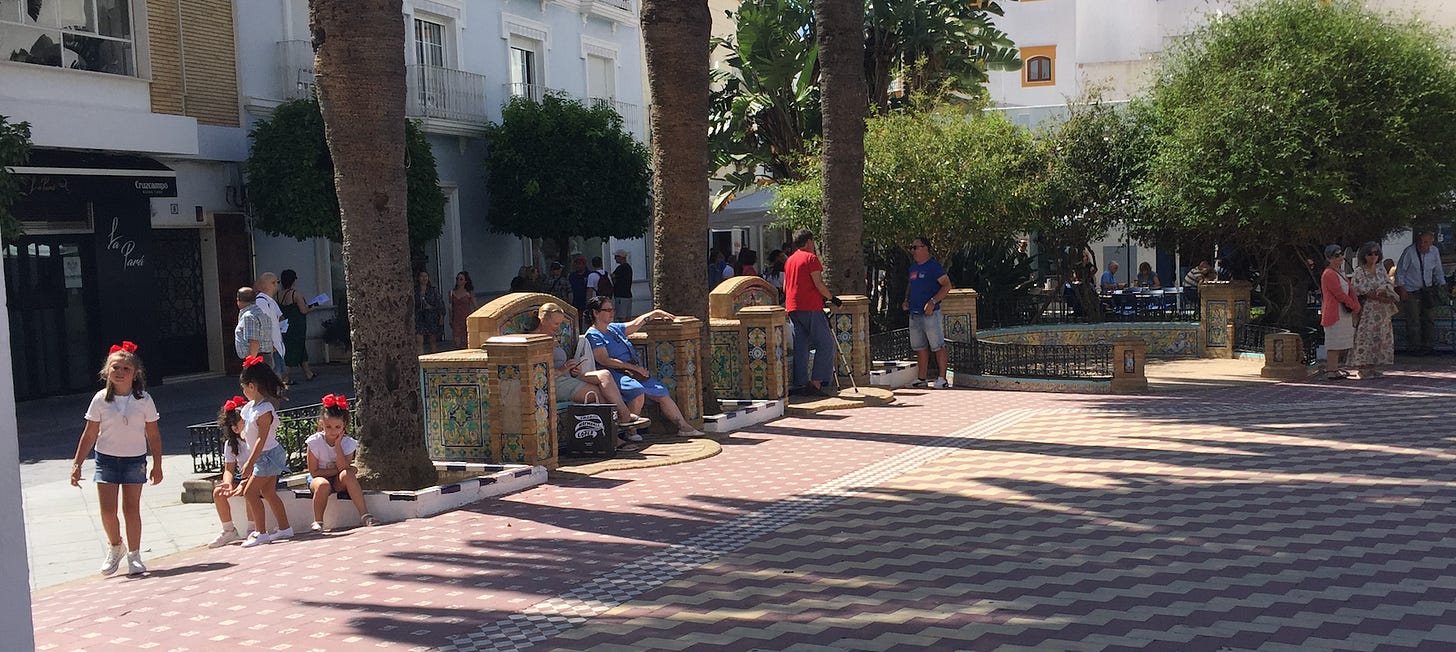This week I spent some time back in Spain. I used to live just outsideAyamonte, which is right on the border with Portugal, but couldn’t be more different than their cousins across the estuary.
Petrol prices have risen somewhat since I was last here, but other prices seem to be much cheaper than in Portugal. Menu del dia in Portugal is usually twelve to fifteen euros. Prices in Ayamonte were as low as 9.50 in some restaurants.
As usual, the squares were full of people just sitting and chatting, hordes of kids wizzing around, and me taking fotos
I think I should move back to Spain. I spent a large part of my youth wandering around the country, and I feel it is my spiritual home. I’ve written four books about my time there. Two of those books I’ve published on Amazon. I’ll leave the links to both of them at the end of this blog. I will also upload book four in the near future. I just need to finalise the cover. Meanwhile, here is a clip from the first chapter of that book:
It was milder by the Pyrenees. But there was a totally different culture nestled in among the foothills around Canigou. This area didn't seem to be France at all. The minute you got off the main road everything changed. The little towns and villages were tightly constructed with tree lined avenues, and quaint little squares with fountains. Rivers tumbled around everywhere. And wherever you looked there were hills backed by the great bulk of the Pyrenees, with Canigou squatting on its own, dominating the whole area.
We drove up a hill towards the small town of Ceret. We wandered around the green streets. We sat in the square of the seven fountains. We even had a meal in a restaurant with the splendid name of Les Pieds dans le Plat, which I translated as 'hooves in the trough'. And the food was good. We decided to stay. This was where I wanted to live. I loved the place.
We walked up a splendid curved set of steps to a hotel lobby and asked for a room. The woman in reception looked startled, then puzzled, and said she would have to check if there was a room available. She brought out a massive black book and poured over the pages, finally deciding that there was indeed a double room at the front overlooking the street. We checked in.
We later discovered we were the only customers.
We had one of those silly little balconies that will accommodate one person standing up, but I spent ages standing there watching the comings and goings down the street. I couldn't make up my mind quite where I was. Was this France? There was a definite French feel, but there was something else.
"You are in Catalonia," said one of my new friends at the top of the hill.
"Catalonia?" I was puzzled. "I thought Catalonia was the other side of the mountains, in Spain."
"No, my friend. Catalonia starts where the foothills of the Pyrenees start. Catalonia is older than either modern France or Spain." And he nudged me across to the nearest bar where he proceeded to get me up to speed on the local culture.
Apparently Catalonia was a very ancient principality which, in the middle ages, stretched across modern Rousillon right down to the province of modern day Tarragona, with Barcelona as its capital.
Apparently during the eighth century the Moorish empire stretched right up to Tours. I had no idea they had got that far. But in 732 there was a great battle, which put the Moors on the run, and they had been retreating ever since. In 795 Charlemagne pushed them beyond the Pyrenees, and he then set up a series of buffer states between the Franks and the Moors. One of these states was Catalonia.
By 987 the count of Barcelona no longer recognised the French king, and Catalonia became an independent state. No wonder the Catalonians want their independence back from Spain. Interestingly, the parliament of Catalonia dates back to the eleventh century, making it one of the earliest in Europe. This puts Catalonia ahead of the UK by nearly 200 years, as the English parliament was only initiated by Simon de Montfort, the sixth Earl of Leicester, in the middle of the thirteenth century.
Catalonia expanded to cover Spain as far as Valencia, and across the sea to the Balearic Islands, and even as far as Sardinia.
In the evening we walked into the square of the seven fountains, and had a meal at Les Pieds. The soupe de poisson was different from the dish I was used to, coming as it did with a spicy red sauce which I stirred into the juices, rather than the garlic sauce used in the north. On the menu were salt water fish, fresh water fish, vegetable stews, and mutton stews. It was all rather delicious.
The next day we drove up the valley of the Tech to Amelie les Bains. This is a charming town set in a lovely valley. It is an old Roman spa town with numerous sulphurous warm springs. The river is particularly interesting as the trout are plentiful.
And then there is the pleasantly warm evening walk back through the tree-lined streets to our hotel. The lamp-light is scattered through the branches of the trees. The town has a very pleasant ambiance. Yes, I could get to like this place. Maybe this is what I'm looking for. And one could even drive down the motorway to Barcelona. It was a long drive, but it was do-able.
We wandered up the valleys, through the charming little spa town of Amelie-les-Bains, and right up to Prats-de-Mollo. This is a walled town with narrow cobbled streets and plenty of medieval architecture. We followed the river Tech. It was carnival time. We sat on a balcony and watched the street fill with a pageant. Men wearing red and white striped shirts danced in a ritual way down the street bearing highly painted swords. Our neighbours explained that it was a pageant in memory of the times of Charlemagne, when the Franks were fighting the Moors, which they eventually drove over the mountains and into Spain.
Being only thirteen kilometres from the border it had been a centre for those wishing to join the Spanish republican cause. And from here many supporters were guided over the frontier during the civil war.
By doubling back around Canigou we manage to reach Prades on the other side. I am disappointed with the town, as there seems to be nothing special there. It had been the home of the exiled Spanish cellist Pablo Casals. In 1950 he instituted a music festival in the town which is still held every year at the beginning of august.
It is also a seriously catalan town, with people still speaking catalan in the streets. The houses cluster around a busy centre, and then huddle up the hillside to the base of the heavy walls of the monastery at the top.
I didn't find any house that I would like to buy, and so we returned to England. But I was fascinated by the place, and later in that year we were back driving down the motorway called La Catalane. It sweeps down to the small town of Le Boulou. The place has a main street, a couple of link roads to the motorway, petrol stations and hotels. To the south the road goes resolutely through a shallow valley in the Pyrenees, and down into Spanish Catalunya.
We turn off towards our favourite village of Ceret, to the hotel at the top of the hill. The routine is the same as ever. Madame insists on getting out her large book and carefully scrutinising details kept within. Of course, the place is empty. We know that, she knows that, and I'm sure she knows that we know. I go onto the small balcony at the front of the hotel. It has rather an impressive entrance, up sweeping stairs on each side of this small balcony.
"Ah yes," she calls, "I have a room at the front for two." It is the room she always gives us. She knows that, we know that, and I'm sure she knows that we know. But ritual is no doubt an important part of life, especially here where to the south is a long high slope up to the top of a mountain with nothing between us and the Spanish border, and pretty well bugger all for miles on the other side.
We go to our favourite restaurant in the square with the fountain of the seven spouts, and eat savoury crepes.
Then we drive up the valley of the Tech, and this time take the twisting road to the frontier. And that's were we hit a rather serious snag.
Books quoted in this blog:
The Last Troubadour in Spain
https://www.amazon.co.uk/dp/B00OMZZAPO
https://www.amazon.com/dp/B00OMZZAPO
With Annabel in Spain
















Share this post